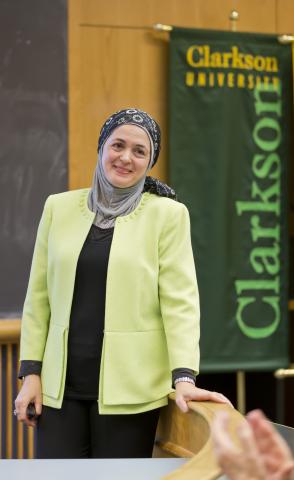Clarkson University Alumna Abeer Al Bawab Named to IUPAC Distinguished Women in Chemistry or Chemical Engineering
March 10, 2021

Clarkson University alumna Abeer Al Bawab is one of only 12 recipients worldwide of the IUPAC 2021 Distinguished Women in Chemistry or Chemical Engineering award.
Al Bawab is a professor of physical chemistry in the University of Jordan and former general director of the Jordan Scientific Research Support Fund in the Ministry of Higher Education & Scientific Research.
The awards program, which celebrates the International Day of Women and Girls in Science, was created by the International Union of Pure and Applied Chemistry (IUPAC) to acknowledge and promote the work of women chemists/chemical engineers worldwide. The International Day of Women and Girls in Science is a global day celebrating achievement and promoting full and equal access to and participation in science for women and girls.
Al Bawab earned her master of science degree in chemistry from Clarkson in 1996 and her Ph.D. in applied physical chemistry from Clarkson in 1997, mentored by Professor Stig Friberg. She has also served as a visiting researcher in the laboratory of Clarkson Center for Advanced Materials Processing Professor Richard Partch.
These 12 awardees were selected based on excellence in basic or applied research, distinguished accomplishments in teaching or education, or demonstrated leadership or managerial excellence in the chemical sciences.
"The group of this year’s awardees comprises highly worthy recipients from all over the world who have all made a significant contribution to advancing the chemical and chemical engineering sciences," said Prof. Christopher Brett, president of IUPAC. "The award has been the focus of increasing attention since its inception in 2011, the International Year of Chemistry, and that we certainly plan to continue in the future.”
Al Bawab's main research interests are in the chemistry of nanoscience in the field of the environment & water and in the application of colloid chemistry in nature by studying colloidal solution stability and associated structure of surfactant systems in different environments, such as emulsions, microemulsions, liquid crystals, micelles and foams, fragrances and flavors systems.











































